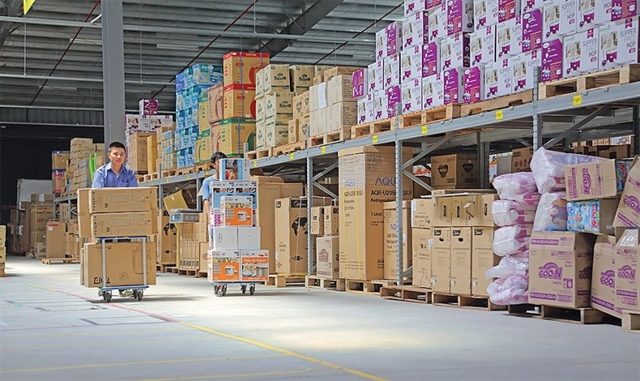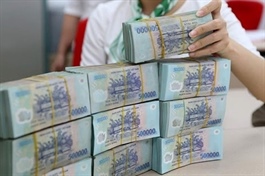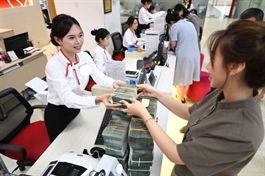Tax exemptions for low-value goods may simplify customs procedures
Tax exemptions for low-value goods may simplify customs procedures
The Ministry of Finance is proposing tax exemptions for low-value goods imported via e-commerce platforms, aiming to simplify tax and customs procedures but raising concerns over potential pressure on domestic production.
|
In the draft decree on customs procedures for export and import goods via e-commerce, the Ministry of Finance (MoF) proposed that import orders worth VND1 million ($40) or less be exempt from import tax. Compared to current regulations, the value of goods eligible for exemption would be halved, down from $80. Each organisation or individual would only be entitled to this tax exemption for goods worth no more than $1,900 per year.
The proposal seeks to ensure convenience for customs declarants and authorities in monitoring and implementing customs procedures, avoiding budget losses, facilitating domestic production and business activities, and aligning with international practices.
Previously, the prime minister abolished the exemption of import and VAT for imported goods worth $40 or less. Since February 18, goods worth $40 or less imported via express delivery services have been subject to import and VAT charges.
The new proposal has received mixed reactions. Nguyen Khanh Ly, a seller on e-commerce platforms living in Hanoi’s Cau Giay district, said, “Removing tax on small items is good news for us. Wholesalers often import small goods from China, and consumers can buy cheap, quality goods with fast delivery.”
Le Thu Phuong, another vendor on e-commerce platforms, said importing cheap goods would diversify the domestic goods market, putting pressure on domestic manufacturers to improve technology, enhance productivity, and boost competitiveness.
“This new policy will impact vendors like us because we import a lot and could easily surpass the $1,900 threshold per year. However, as wholesalers, doing business and paying taxes is our responsibility,” she added.
According to the Ministry of Industry and Trade, there are about 4-5 million small orders with a value of less than $40 shipped from China to Vietnam daily. If the tax exemption policy is applied to this group, around $13 million worth of tax would be exempted each year.
Expert Vu Vinh Phu believes that collecting tax on shipments worth less than $40 is necessary. “It would create fairness among businesses and support domestic manufacturers from being squeezed, especially amidst the wave of cheap goods entering Vietnam,” he said.
In recent years, Vietnam’s e-commerce sector has seen strong growth in both scale and form. In 2024, the size of the retail e-commerce market was estimated to exceed $25 billion, marking a 20 per cent increase on-year. Vietnam is currently ranked among the top 10 countries with the fastest e-commerce growth rates worldwide, after Indonesia ($65 billion) and Thailand ($26 billion).
Nguyen Van Duoc, general director of Trong Tin Accounting and Tax Consulting, said the proposed tax exemption for small-value goods aligns with commitments to simplify customs procedures.
“However, exemptions may lead to unfairness between different import methods and domestic manufacturers. Moreover, buyers could circumvent the law by splitting orders. It is necessary to carefully consider the reasonableness of this proposal to avoid creating loopholes in tax management policies,” he said.
Expert Pham Ngoc Hung, former vice president of the Vietnam Association for Anti-Counterfeiting and Brand Protection, expressed a different view, opposing the collection of taxes on packages valued under $40.
“Collecting taxes on small-value orders would create major difficulties for customs and tax authorities, given the large number of orders each day. The administrative and technological burden would be significant,” Hung said.
He cited the example of Ho Chi Minh City’s efforts to collect pavement parking fees, which resulted in heavy losses due to the high costs of building the collection apparatus compared to the revenue generated.
“Although collecting parking fees and collecting import taxes are different, the common problem lies in implementation. We would need a large administrative team or costly IT infrastructure upgrades for the e-customs system, along with ongoing salary expenses to maintain operations,” Hung added.
Regarding experience in managing imported goods via e-commerce, the draft decree noted that Thailand collects 7 per cent VAT on low-value imported goods from China priced below 1,500 baht ($44).
South Korea is considering amending the E-Commerce Act to require large foreign online platform operators to establish local offices in the country. Currently, imported goods below a certain threshold are exempt from customs duties and taxes, set at $150 for most imports and $200 for shipments from the United States.
In China, sellers must pay corporate income tax and VAT to sell goods on e-commerce platforms. At the same time, China strictly regulates certain goods imported via e-commerce, allowing only end-consumer sales and prohibiting resale.
- 18:14 28/04/2025





























